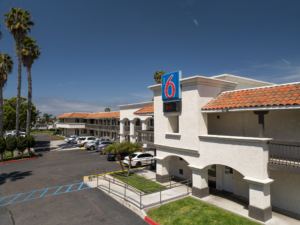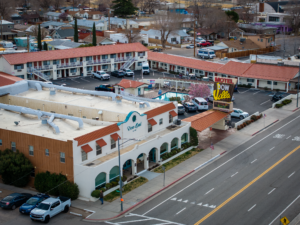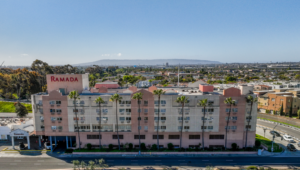Downtown San Francisco Hilton hotels could net a discount for a patient buyer
Downtown San Francisco Hilton hotels could net a discount for a patient buyer
By Alex Barreira – Staff Reporter, San Francisco Business Times
Jun 5, 2023 Updated Jun 5, 2023, 5:25pm PDT
The expected ownership change of the Hilton San Francisco Union Square and Parc 55 hotels could play a significant role in shifting local hotel market dynamics for the near term, arriving on the heels of several other debt-impacted hotel dispositions.
The expression of diminished confidence by owner Park Hotels & Resorts — which said Monday it would stop payments on a loan behind the hotels, and work out an arrangement with the lender that it expects will remove the two large hotel properties from its portfolio — is likely to weigh on investors, experts said.
It could become the latest notable instance of debt-saddled hotels hitting the market in San Francisco, following the recent sale of Nob Hill’s luxury Huntington Hotel and marketing of the defaulted Standford Court Hotel. It sets the stage for a a drop in San Francisco’s typically sturdier key prices.
The Hilton and Parc 55 were valued at a combined $1.56 billion in an appraisal at the time of the loan underwriting in 2016, according to a CMBS industry report on the loan for bond investors. Should the outcome of the negotiations be Park (NYSE: PK) surrendering the hotels’ title to the lender on the basis of the $725 million loan, it would represent a 53% decline from that appraised value. In the meantime, the hotels will remain open under the Hilton flag.
Alan Reay, president of Irvine-based Atlas Hospitality, which tracks hotel transactions worldwide, said that historically San Francisco hotels have been last in line for owners to cut bait when the going gets tough. Replacement costs in such a supply-constrained market are staggering and few investors are willing to bet long-term against this gateway market.
“Very few people have given up the keys or walked away,” Reay told me Monday. “It’s been the sort of market you could invest in and you’re resilient to what’s happened everywhere else where people get foreclosed on.”
But that may be finally changing.
“In a way this is unprecedented,” he added. “The question is whether that’s going to be the dominoes that tilt other people to go over.”
Park’s debt per key on the two hotels is about $246,347 a key, or “substantially below replacement costs,” Reay said. That amount is less than the recent sales of the Claremont Berkeley hotel ($585,305 per key); and the Hotel Spero ($300,847 per key) and the Marker Hotel ($370,192) — both sold by Pebblebrook Hotel Trust.
Reay anticipates a number of factors could result in the Hilton hotels selling for less than $200,000 per key — perhaps closer to a level at which investors believe the property could reliably generate income.
For one, otherwise interested buyers may be contending with loans coming due in the next 12 to 18 months with higher interest rates than they’re accustomed to. Experts anticipate a lot of CMBS loans coming to maturity this year and next.
“Given where capital markets are, I think you need to pick your battles,” said John Berean, senior vice president at HVS leading the firm’s Hawaii and Northern California team. “Refinancing $725 million in a market that is still in the midst of recovery, at significantly higher interest rates, is going to be challenging for any ownership group.”
Any new owner will need deep pockets and a lot of patience. The older product will likely call for a full renovation (Reay said this could easily land at between $50,000 and $100,000 per room).
There’s the reality, too, that the size and location of these hotels makes them very expensive to run even when they were without guests during temporary pandemic closure. Examining the two Hiltons’ financials from 2020 through 2022, Atlas’ CEO said that outside of debt service to loans and negative cash flow, Park injected more than $100 million into the two Hiltons in that time.
“I think the only buyers who could take down these types of assets are limited to a private investment fund, sovereign wealth fund, and maybe one or two REITs,” said Berean, adding that Blackstone Group — former owner of the Parc 55 — comes to mind. “Over the long-term, these two hotels are great assets, but just to clear the near-term is going to be a massive financial drain.”
And prudent buyers, Berean added, are more likely to wait for more attractive opportunities and pricing to decline further.
“I think JPMorgan will not fire-sale these assets, and might end up waiting a year or two before a prospective buyer comes into the picture,” Berean said.
Though San Francisco’s hotels have rebounded substantially from where they were last year in terms of average daily rate (ADR) and occupancy, San Francisco along with San Jose are the only major markets not to reach their 2019 levels. With a 70% occupancy in May, San Francisco also lagged comparable slow-starter New York, where business has picked up to 86% occupancy in April, according to STR.
“Factor this with the two deals in Nob Hill, you’re starting to see a new price point on a per-room level,” Reay said. “If you don’t have to sell right now, you’re fine. But if you have to refinance, that’s going to have a serious impact.”
Reay said the Hiltons will likely draw interest from international hotel companies, well-capitalized investors already in San Francisco without a lot of debt. Or maybe even newcomers to the industry entirely, he added, noting the Fairmont San Jose’s purchase in 2018 by Eagle Canyon Capital — formerly known as Pacific Convenience & Fuels, with its main business a portfolio of more than 250 gas stations.
“We’re also seeing a lot of these larger hotels now attracting attention from residential investors as well,” Reay said. “At some point you start to see these buyers who come in and say, the numbers make more sense to convert than for a hotel.”



